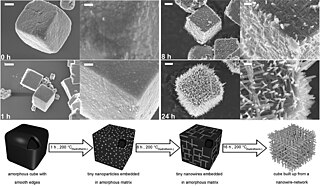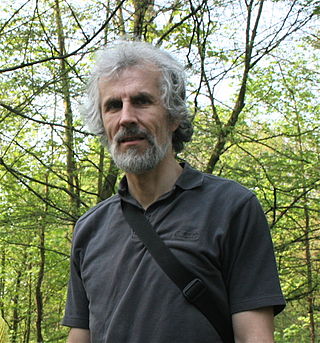Related Research Articles
Evolutionary psychology is a theoretical approach in psychology that examines cognition and behavior from a modern evolutionary perspective. It seeks to identify human psychological adaptations with regards to the ancestral problems they evolved to solve. In this framework, psychological traits and mechanisms are either functional products of natural and sexual selection or non-adaptive by-products of other adaptive traits.
Memetics is a theory of the evolution of culture based on Darwinian principles with the meme as the unit of culture. The term "meme" was coined by biologist Richard Dawkins in his 1976 book The Selfish Gene, to illustrate the principle that he later called "Universal Darwinism". All evolutionary processes depend on information being copied, varied, and selected, a process also known as variation with selective retention. The conveyor of the information being copied is known as the replicator, with the gene functioning as the replicator in biological evolution. Dawkins proposed that the same process drives cultural evolution, and he called this second replicator the "meme," citing examples such as musical tunes, catchphrases, fashions, and technologies. Like genes, memes are selfish replicators and have causal efficacy; in other words, their properties influence their chances of being copied and passed on. Some succeed because they are valuable or useful to their human hosts while others are more like viruses.

In computer science, evolutionary computation is a family of algorithms for global optimization inspired by biological evolution, and the subfield of artificial intelligence and soft computing studying these algorithms. In technical terms, they are a family of population-based trial and error problem solvers with a metaheuristic or stochastic optimization character.

The term autopoiesis refers to a system capable of producing and maintaining itself by creating its own parts. The term was introduced in the 1972 publication Autopoiesis and Cognition: The Realization of the Living by Chilean biologists Humberto Maturana and Francisco Varela to define the self-maintaining chemistry of living cells.

Self-organization, also called spontaneous order in the social sciences, is a process where some form of overall order arises from local interactions between parts of an initially disordered system. The process can be spontaneous when sufficient energy is available, not needing control by any external agent. It is often triggered by seemingly random fluctuations, amplified by positive feedback. The resulting organization is wholly decentralized, distributed over all the components of the system. As such, the organization is typically robust and able to survive or self-repair substantial perturbation. Chaos theory discusses self-organization in terms of islands of predictability in a sea of chaotic unpredictability.
In biology, adaptation has three related meanings. Firstly, it is the dynamic evolutionary process of natural selection that fits organisms to their environment, enhancing their evolutionary fitness. Secondly, it is a state reached by the population during that process. Thirdly, it is a phenotypic trait or adaptive trait, with a functional role in each individual organism, that is maintained and has evolved through natural selection.
Developmental robotics (DevRob), sometimes called epigenetic robotics, is a scientific field which aims at studying the developmental mechanisms, architectures and constraints that allow lifelong and open-ended learning of new skills and new knowledge in embodied machines. As in human children, learning is expected to be cumulative and of progressively increasing complexity, and to result from self-exploration of the world in combination with social interaction. The typical methodological approach consists in starting from theories of human and animal development elaborated in fields such as developmental psychology, neuroscience, developmental and evolutionary biology, and linguistics, then to formalize and implement them in robots, sometimes exploring extensions or variants of them. The experimentation of those models in robots allows researchers to confront them with reality, and as a consequence, developmental robotics also provides feedback and novel hypotheses on theories of human and animal development.
A complex adaptive system is a system that is complex in that it is a dynamic network of interactions, but the behavior of the ensemble may not be predictable according to the behavior of the components. It is adaptive in that the individual and collective behavior mutate and self-organize corresponding to the change-initiating micro-event or collection of events. It is a "complex macroscopic collection" of relatively "similar and partially connected micro-structures" formed in order to adapt to the changing environment and increase their survivability as a macro-structure. The Complex Adaptive Systems approach builds on replicator dynamics.

Francis Paul Heylighen is a Belgian cyberneticist investigating the emergence and evolution of intelligent organization. He presently works as a research professor at the Vrije Universiteit Brussel, where he directs the transdisciplinary "Center Leo Apostel" and the research group on "Evolution, Complexity and Cognition". He is best known for his work on the Principia Cybernetica Project, his model of the Internet as a global brain, and his contributions to the theories of memetics and self-organization. He is also known, albeit to a lesser extent, for his work on gifted people and their problems.
Evolutionary developmental psychology (EDP) is a research paradigm that applies the basic principles of evolution by natural selection, to understand the development of human behavior and cognition. It involves the study of both the genetic and environmental mechanisms that underlie the development of social and cognitive competencies, as well as the epigenetic processes that adapt these competencies to local conditions.
Evolutionary educational psychology is the study of the relation between inherent folk knowledge and abilities and accompanying inferential and attributional biases as these influence academic learning in evolutionarily novel cultural contexts, such as schools and the industrial workplace. The fundamental premises and principles of this discipline are presented below.

Biological or process structuralism is a school of biological thought that objects to an exclusively Darwinian or adaptationist explanation of natural selection such as is described in the 20th century's modern synthesis. It proposes instead that evolution is guided differently, by physical forces which shape the development of an animal's body, and sometimes implies that these forces supersede selection altogether.

Biological organisation is the organisation of complex biological structures and systems that define life using a reductionistic approach. The traditional hierarchy, as detailed below, extends from atoms to biospheres. The higher levels of this scheme are often referred to as an ecological organisation concept, or as the field, hierarchical ecology.

The global brain is a neuroscience-inspired and futurological vision of the planetary information and communications technology network that interconnects all humans and their technological artifacts. As this network stores ever more information, takes over ever more functions of coordination and communication from traditional organizations, and becomes increasingly intelligent, it increasingly plays the role of a brain for the planet Earth. In the philosophy of mind, global brain finds an analog in Averroes's theory of the unity of the intellect.
Cognitive science of religion is the study of religious thought, theory, and behavior from the perspective of the cognitive sciences. Scholars in this field seek to explain how human minds acquire, generate, and transmit religious thoughts, practices, and schemas by means of ordinary cognitive capacities.
Michael Terrence McGuire was an American psychiatrist who made contributions to the theory of psychoanalysis, biological psychiatry, evolutionary biology, sociobiology and the theory and practice of psychiatry.
Universal Darwinism, also known as generalized Darwinism, universal selection theory, or Darwinian metaphysics, is a variety of approaches that extend the theory of Darwinism beyond its original domain of biological evolution on Earth. Universal Darwinism aims to formulate a generalized version of the mechanisms of variation, selection and heredity proposed by Charles Darwin, so that they can apply to explain evolution in a wide variety of other domains, including psychology, linguistics, economics, culture, medicine, computer science, and physics.
Morphogenetic robotics generally refers to the methodologies that address challenges in robotics inspired by biological morphogenesis.

Artificial life is a field of study wherein researchers examine systems related to natural life, its processes, and its evolution, through the use of simulations with computer models, robotics, and biochemistry. The discipline was named by Christopher Langton, an American computer scientist, in 1986. In 1987, Langton organized the first conference on the field, in Los Alamos, New Mexico. There are three main kinds of alife, named for their approaches: soft, from software; hard, from hardware; and wet, from biochemistry. Artificial life researchers study traditional biology by trying to recreate aspects of biological phenomena.

Luis M. Rocha is the George J. Klir Professor of Systems Science at the Thomas J. Watson College of Engineering and Applied Science, Binghamton University. He has been director of the NSF-NRT Complex Networks and Systems graduate Program in Informatics at Indiana University, Bloomington, USA. He is also director of the Center for Social and Biomedical Complexity, between Binghamton University and Indiana University, Bloomington, a Fulbright Scholar, and Principal Investigator at the Instituto Gulbenkian de Ciência, Portugal. His research is on complex systems and networks, computational and systems biology, biomedical complexity and digital health, and computational intelligence.
References
- ↑ Rada, Roy. "Evolution and gradualness." BioSystems 14.2 (1981): 211-218.
- ↑ Laszlo, Alexander. "Evolutionary Systems Design." Journal of Organisational Transformation & Social Change 1.1 (2004): 29-46.
- ↑ Rammel, Christian, and Jeroen CJM van den Bergh. "Evolutionary policies for sustainable development: adaptive flexibility and risk minimising." Ecological Economics 47.2 (2003): 121-133.